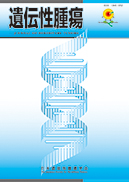Volume 22, Issue 2
Displaying 1-6 of 6 articles from this issue
- |<
- <
- 1
- >
- >|
Original
-
Article type: Original
2022Volume 22Issue 2 Pages 36-40
Published: October 31, 2022
Released on J-STAGE: October 31, 2022
Download PDF (774K)
Case report
-
Article type: case-report
2022Volume 22Issue 2 Pages 41-44
Published: October 31, 2022
Released on J-STAGE: October 31, 2022
Download PDF (987K) -
Article type: case-report
2022Volume 22Issue 2 Pages 45-48
Published: October 31, 2022
Released on J-STAGE: October 31, 2022
Download PDF (1005K)
Clinical Experience
-
Article type: Clinical Experience
2022Volume 22Issue 2 Pages 49-53
Published: October 31, 2022
Released on J-STAGE: October 31, 2022
Download PDF (923K) -
Article type: Clinical Experience
2022Volume 22Issue 2 Pages 54-59
Published: October 31, 2022
Released on J-STAGE: October 31, 2022
Download PDF (953K)
Editors Note
-
2022Volume 22Issue 2 Pages 60
Published: October 31, 2022
Released on J-STAGE: October 31, 2022
Download PDF (555K)
- |<
- <
- 1
- >
- >|
